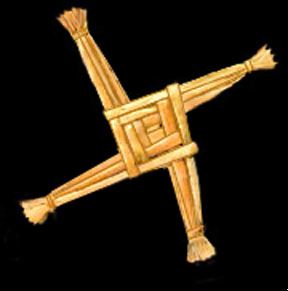Brigid: Goddess, Saint and Keeper of the Flame
[This is the first of four posts leading up to St. Patrick’s Day in celebration of all things Irish].
Brigid’s Cross, protection for the home
One of the ways Christianity wove its way into the hearts and minds of the original peoples was by adopting their ancient gods, goddesses and festivals in order to more easily convert them without bloodshed.
For example, the evidence is that Jesus Christ was born in the spring, but our pre-Christian ancestors were already celebrating the birth of a wondrous male child, born of a virgin, around the time of the Winter Solstice, so it made sense to decree this as the time of birth of Christ. It made for easy conversion.
Christianity also incorporated most of the significant aspects of Mithra, son of the Persian sun God, who died at the spring equinox, heralding the time of Easter.
So many Christian holidays parallel those of our ancestors that it can be hard to tell where one begins and the other ends. The same can be said of the saints.
Goddess and Saint Brigid
One of the most famous Celtic Goddesses is Bridget, Brigid or Brid (pron. Breed). There are many more versions of her name; I am partial to Brid. She is so steeped in legend that it is hard to tell the Goddess apart from the Christian Saint Bridget.
Brid is the nearest thing we have to a Great Mother of the Celts. She is deeply associated with the island of Ireland; many rivers and many women bear her name. She is reputed to have lived in the Fifth Century and these are the qualities she was renowned for:
- Wisdom
- Poetry
- Protection of the hearth, home and animals
- Healing
- Smithcraft
- Hospitality
She is the epitome of the gifts that women offer.
The best illustration of her status in the history of Ireland is the folk tradition which tells how Brid spread out her green mantle over all her beloved country of Ireland and turned it into the Emerald Isle.
With the coming of Christianity, this powerful Goddess Brid became St. Brigid, second only to St. Patrick in the Irish hierarchy of saints. And the saint inherited much of the folklore of the goddess.
The Story of the Full Pot
The daughter of Druids, Brid fed the poor, animals and birds with an open heart. One day she was preparing food for her father’s guests and a starving dog limped into the kitchen, drawn by the smell of bacon. Brid gave the dog a piece of bacon, then another, and another, until she realized with horror that the pot was empty.
When her father came into the kitchen to see if dinner was ready, Brid replied, “Go look in the pot,” while she prayed very, very hard.
He did, and found the pot full.
Such is the support a kind heart gets from the angels.
Brigid’s Fire
A perpetual flame known as “Brigid’s Fire” burned in Kildare, Ireland in pre-Christian times to invoke the Goddess Brigid to protect the herds and provide a fruitful harvest.
St. Brigid founded a church and abbey in the Fifth Century that continued the tradition of burning the perpetual Flame of Kildare. The Brigidine Sisters kept the flame burning until the 16th Century, when the church decided the ritual was too pagan and had the flame extinguished. It was relit in 1993 by the Brigidine Sisters in dedication to peace and justice and still burns today.
Brid is still honored today as the Goddess who keeps alive hope and inspiration. Her feast day is February 1, which is also the first day of spring in the Celtic calendar, signifying the return of the green and reawakening of the earth.
Consider Brid as a mentor and protector. When I travel, I call upon Brid to protect my home and animals while I am gone.
When you light a fire or a candle, call upon Brid to keep the fire lit, keep it safe, and to bring light, inspiration and protection into your life.
Molly Larkin is the co-author of the international best-seller “The Wind Is My Mother; The Life and Teachings of a Native American Shaman” and other books on health. She is passionate about helping people live life to their fullest potential through her classes, healing practice and blog at www.MollyLarkin.com

